|
|
|
Sort Order |
|
|
|
Items / Page
|
|
|
|
|
|
|
| Srl | Item |
| 1 |
ID:
092376
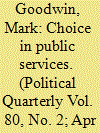

|
|
|
|
|
| Publication |
2009.
|
| Summary/Abstract |
Choice, diversity and personalisation have been key to the New Labour project in public services. With the emergence of a reinvigorated Conservative party as a credible electoral threat, and the end of the Blair era, it seems appropriate to consider the continuing viability and longevity of the New Labour public service project. In this article, I approach the issue of choice in public services through an examination of the long-running controversy over choice in the English secondary school system. I argue that the opponents of choice have been reluctant to engage with the notion of choice in public services due to concerns over the supposed negative effect that consumer choice has on the equity and quality of service provision. This paper aims to challenge the claim that any element of choice in education necessarily has deleterious effects on social justice. I argue that the case against school choice has not been decisively made and that school choice can, in principle, form part of a socially progressive educational project by redistributing power to service users and helping to maintain popular support for public provision of education.
|
|
|
|
|
|
|
|
|
|
|
|
|
|
|
|
| 2 |
ID:
132834
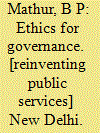

|
|
|
|
|
| Publication |
New Delhi, Routledge, 2014.
|
| Description |
xii, 396p.
|
| Standard Number |
Pbk
|
|
|
|
|
|
|
|
|
|
|
|
Copies: C:1/I:0,R:0,Q:0
Circulation
| Accession# | Call# | Current Location | Status | Policy | Location |
| 057861 | 351.54/MAT 057861 | Main | On Shelf | General | |
|
|
|
|
| 3 |
ID:
169772


|
|
|
|
|
| Summary/Abstract |
The unfair distribution of public sector jobs is a common grievance in many societies, but arguably more so in ethnically polarized ones. Using census data from Kenya and Uganda, two countries with a history of ethnic conflict, this article examines how public employment is allocated in multi-ethnic societies by studying the correlates of holding public sector jobs. The results demonstrate that the public services of Kenya and Uganda are first and foremost comprised of educational elites with considerably higher average levels of educational attainment than across the labour forces at large. However, when education is controlled for, high-skilled women and candidates from less developed districts are more likely to work for the state than others. As a result, public sector jobs are more equitably distributed along gender, regional and ethnic lines than education alone would predict. I hypothesize that formal policies to promote regional equity in the provision of basic services in combination with affirmative action measures are contributing to creating comparatively inclusive public services.
|
|
|
|
|
|
|
|
|
|
|
|
|
|
|
|
| 4 |
ID:
166355


|
|
|
|
|
| Summary/Abstract |
Quality of electricity service remains poor in many developing countries. Here we examine factors that influence stated willingness to pay for better service (i.e., more hours of power per day) among rural and urban households in Uttar Pradesh, India. Besides suggesting that low willingness to pay is a major obstacle to pricing reform, we find that respondents with more social trust are willing to pay more. In a randomized survey experiment, we also find that delays in service improvements and a lack of community support for pricing reform reduce willingness to pay. These results confirm the importance of non-financial considerations in popular support for policies that impose higher prices in exchange for better service. However, we do not find evidence for sense of entitlement – the belief that government should offer basic goods and services for free – as a predictor of low willingness to pay. These results offer useful input for effective strategies to reform electricity pricing for better service and, ultimately, economic growth, particularly in areas where electricity is heavily underpriced and where governance is weak.
|
|
|
|
|
|
|
|
|
|
|
|
|
|
|
|
| 5 |
ID:
176661
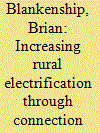

|
|
|
|
|
| Summary/Abstract |
To reach the United Nations Sustainable Development Goal of universal household electrification by 2030, developing countries are spending billions of dollars to expand access. India, for example, recently undertook an audacious expansion plan which aimed to electrify every household by December 2018. However, there is little academic study of strategies to increase electrification rates. We argue that significant transaction costs inhibit household applications for connections. As evidence, we report the results of a randomized controlled trial (in 200 communities and 2000 households) in the Indian state of Uttar Pradesh, with a treatment consisting of an informational campaign about the costs and procedure of applying. We found that households exposed to the campaign were three times as likely to apply for a connection. Yet actual connection rates remained unchanged. The results suggest that transaction costs are an important barrier to electrification, but limited capacity and incentive to expand connections are equally important.
|
|
|
|
|
|
|
|
|
|
|
|
|
|
|
|
| 6 |
ID:
187418
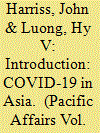

|
|
|
|
|
| Summary/Abstract |
In this introduction to studies of the politics of the COVID-19 pandemic in four Asian states—India, Pakistan, Vietnam, and South Korea—we first discuss the difficulties in evaluating the performances of different countries, given the varying reliability of data and the different possible criteria that may be applied. In our studies we aim rather to illuminate the process of different state responses, and we go on to summarize evidence on different patterns of response across Asia, situating the four country studies in a comparative context. We then review arguments in the literature about the determinants of different responses, before presenting our framework for the analysis of the politics that underlie these differences. Political leadership has undoubtedly exercised a powerful influence, but in the structural context of the relationships of state and citizens. We argue that understanding of these relationships is advanced by an analytical framework that draws on state-in-society approaches developed in the work of Joel Migdal, Michael Mann, and Peter Evans.
|
|
|
|
|
|
|
|
|
|
|
|
|
|
|
|
| 7 |
ID:
078971
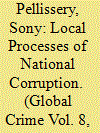

|
|
|
|
|
| Publication |
2007.
|
| Summary/Abstract |
This paper provides a bottom-up view of national corruption in India and presents a framework of corruption involving three actors: bureaucrat, politician and legitimate claimant. The paper then focuses on the public service provision of social security in an Indian village and the role of elites in perpetuating the corrupt practices to access this public provision. This study is based on an extensive fieldwork and uses network data. First, I show that the political elite bridges the 'structural hole' between the institutions of state and society, have the advantage of information, referrals and are the main beneficiary of local corrupt practices. Second, factional politics is carried out through the use of corruption and it results in exclusion of the poor persons from the welfare rights to which they are entitled. The paper also explores how the local processes of corruption interact with state-level processes and shows how protest against corruption is silenced.
|
|
|
|
|
|
|
|
|
|
|
|
|
|
|
|
| 8 |
ID:
155413


|
|
|
|
|
| Summary/Abstract |
Public services—in the UK and elsewhere—are under considerable pressure, not just from austerity, but also from a variety of social, demographic and technological changes (in effect ‘austerity plus’). In this context, three broad options are open to policy-makers: continue with tried-and-tested approaches while spending less money, which in the UK means a reliance on ‘New Public Management’ (NPM); withdraw completely from certain public services; or develop new approaches to public administration. We argue that all of these approaches have been attempted in recent years, but it is the final option that is most interesting and potentially the most beneficial. In this article, we examine experiments with these new approaches in responding to ‘austerity plus’. In particular, we examine various attempts at ‘collaboration’ in public services and discuss the risks associated with them. We conclude by setting out the extent to which policy-makers have moved beyond NPM and suggesting some of the benefits that this could bring.
|
|
|
|
|
|
|
|
|
|
|
|
|
|
|
|
| 9 |
ID:
172037


|
|
|
|
|
| Summary/Abstract |
We analyse the politics of the reform of teacher payment modalities in the Democratic Republic of Congo (DRC) in light of the uneven territorial reach of the DRC state. The reform focused on extending this reach by paying all teachers via a bank account, replacing long-standing shared governance arrangements between state and faith-based organisations with a public-private partnership. By using qualitative and quantitative data, we map the political practices accompanying the implementation of the reform. While the reform itself was officially deemed a success, its intended effects were almost completely offset in rural areas. Moreover, governance of teacher payments was not rationalised but instead became even more complex and spatially differentiated. In sum, the reform has rendered governance processes more opaque and deepened the existing unevenness in the geography of statehood.
|
|
|
|
|
|
|
|
|
|
|
|
|
|
|
|
| 10 |
ID:
122461


|
|
|
|
|
| Publication |
2013.
|
| Summary/Abstract |
Markets are powerful tools for reform in both the public and private realms. But those markets need careful design and stewardship if they are to work to create value rather than simply becoming a mechanism for distributing rents to private investors. SMF Director Ian Mulheirn examines how the social market framework offers the most cogent analysis of recent events and how it can be a vital guide for future policy.
|
|
|
|
|
|
|
|
|
|
|
|
|
|
|
|
| 11 |
ID:
169791


|
|
|
|
|
| Summary/Abstract |
Through use of a unique, multi-year public opinion survey, this paper seeks to measure changes in self-reported governmental satisfaction among Chinese citizens between 2003 and 2016. Despite the persistence of vast socio-economic and regional inequalities, we find evidence that low-income citizens and residents living in China's less-developed inland provinces have actually reported comparatively greater increases in satisfaction since 2003. These results, which we term the “income effect” and “region effect” respectively, are more pronounced at the county and township levels of government, which are most responsible for public service provision. Our findings also show that the satisfaction gap between privileged and more marginalized populations in China is beginning to close, in large part owing to efforts by the Hu Jintao and Xi Jinping administrations to rebalance the gains of economic growth and shift resources towards the populations most overlooked during China's first few decades of reform.
|
|
|
|
|
|
|
|
|
|
|
|
|
|
|
|
| 12 |
ID:
174001
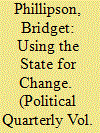

|
|
|
|
|
| Summary/Abstract |
The capacity of the state to deliver transformative social and economic change appears more limited today than since Labour was last in government. A future Labour government will therefore need to reckon with the challenges this presents when it comes to harnessing the power of the state to distribute power, wealth, and opportunity, effectively. This article considers two aspects of state power. The first is the ability of the state to enforce laws, and in doing so shape social and economic norms. With reference to past successes and failures, there is discussion of how laws and regulations could be made more effective. The second aspect is state intervention in the economy, and the circumstances in which it is possible and desirable to nationalise key industries. The case is made for a thorough assessment of the efficiency and efficacy of such interventions in the economy, especially when weighed against other policy priorities.
|
|
|
|
|
|
|
|
|
|
|
|
|
|
|
|
|
|
|
|
|